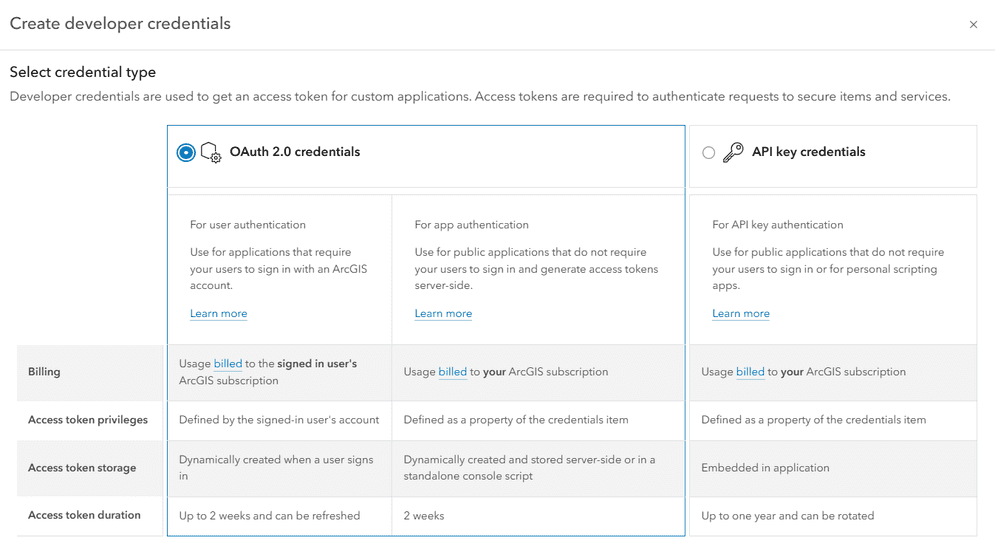Learn how to create OAuth credentials to support user authentication.

OAuth credentials are an item required to implement most user authentication workflows. They contain the client and redirect parameters that are used to implement all OAuth 2.0 user authentication flows. The item page of OAuth credentials allows you to manage settings related to app authentication, including the allowed redirect URLs of an application.
This tutorial shows you how to create OAuth credentials for use in user authentication OAuth 2.0 flows.
Prerequisites
Steps
Sign in to your portal
You use your portal to create and manage items, including OAuth credentials.
-
Access your portal by navigating to ArcGIS.com or the URL of your ArcGIS Enterprise portal instance.
-
Sign in with your ArcGIS account.
Create a new item
The following steps differ depending on if you have an ArcGIS Location Platform, ArcGIS Online, or an ArcGIS Enterprise account:
-
In your portal, click Content > My content > New item.

-
Click Developer credentials > OAuth credentials and click Next.

Add a redirect URL
A redirect URL is a required parameter of user authentication flows. This is the URL that your application will direct users to after they successfully authenticate.
-
In the next window, find the Redirect URLs field.
-
Under Redirect URLs, add the URL that you want to direct users to after completing authentication. This URL varies based on your application and typically takes the format of
"httpsor:// <server >[ :port]/callback.html" "http. This is a valid web page or server endpoint to which a user can be redirected after successful sign in.://my-arcgis-app :/auth" - For example, if you are running an application on
https, add://localhost :8080 httpsto the list of redirect URLs. The exact URL depends on the name of your callback page and the programming language you are using. If you are following a "Sign in with user authentication" ArcGIS tutorial, it will specify the name of your callback page.://localhost :8080/callback.html

- For example, if you are running an application on
-
Under Application environment, select the type of environment your application will run in. This will affect when the OAuth credentials appear in portal search results.

-
Click Next.
Save the item
After configuring the redirect URL of your OAuth credentials, you can save the credentials as a new item.
-
In the Privileges window, click Next. These properties are not required in user authentication.
-
In the Item access window, click Skip. These properties are not required in user authentication.
-
In the Create developer credentials window, set the following properties:
- Title:
My OAuth credentials (for user authentication) - Folder:
Developer credentials(Create a new folder) - Tags:
User authentication - Description: Describe the application that these developer credentials will be used in.

Click Next.
- Title:
-
In the Summary window, review the properties and redirect URL you have set.
-
Click Create to create your OAuth credentials.
Copy the client ID and redirect URL
Your OAuth credentials contain a client parameter that is required to implement user authentication. Copy this value, as well as your provided redirect URL, and paste them into your application.
-
On the item page of your OAuth credentials, scroll down to Credentials.
-
Copy the Client ID value and paste it into your application.

-
Click the Manage button to go to the Settings tab.

-
Under Redirect URLs, copy the redirect URL you provided earlier. Paste it into your application.
What's next?
Learn how to implement user authentication with ArcGIS APIs and SDKs:
Sign in with user authentication
Create an application that requires users to sign in with an ArcGIS account.